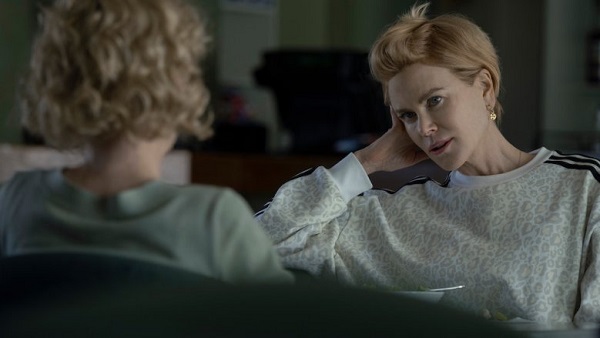
I wanted to love Roar. Based on the limited series’ description as a collection of feminist fables, it should be my jam. The concept sounds like it was made in a lab for women like me. Ladies who pursued Gender Studies in university and regularly attended feminist rallies in their twenties. And yet, it didn’t truly scratch my itch for feminist-friendly art or entertainment.
Based on short stories by Cecilia Ahern, Roar stars such acclaimed powerhouse actresses as Nicole Kidman, Cynthia Erivo, Merrit Wever, Issa Rae, Meera Syal, Betty Gilpin (and oodles more). With such an embarrassment of riches, Roar ought to be my new favourite show. And yet, it comes off as more of a formula for gripping feminist TV than a truly gripping feminist series.
The concepts for Roar’s episodes don’t lack in creativity. They also tackle a bevy of important themes, including racism, sexism, marriage, parenthood, sexuality, and self-esteem. In one installment, Nicole Kidman plays a middle-aged hairdresser caring for her elderly mother plagued by dementia (Judy Davis). At one point, Kidman’s character laments to her husband, “I’m not a daughter anymore. I’m at the end of being a mother. And I’m scared.” The solution? She begins eating pictures from her family’s old photo albums; each time she consumes one, she relives the memory captured by the photograph. It’s a beautiful and poetic story. But the fable’s brevity (the episodes clock in around 30 minutes each) doesn’t allow for enough exploration. The episode is too short to explore the photography-fueled time travel conceit. Instead, an inspired element of science fiction feels like an add-on.
One of the collection’s most memorable episodes is the first, where Issa Rae portrays a bestselling memoirist whose book has been optioned by a Hollywood Studio. She learns that white male studio execs intend to turn her highly personal work of life writing into a VR spectacle catering to privileged white people. And then she begins to disappear. We the viewers can still see her, but suddenly, the author is invisible – and inaudible – to the white people with whom she interacts. It’s a valuable commentary on the racist entertainment industry’s history of disempowering Black women, sidelining or ignoring their voices. But again, the episode ends too soon! While the old adage goes, “keep them wanting more,” when there isn’t another episode of that particular story forthcoming, it’s better to have more than to want more. I could have watched Issa’s journey for at least another hour!
Unfortunately, not all Roar’s stories left me wanting more. One episode that fell flat was Roar’s finale. The final installment stars the charismatic Meera Syal as a wife. She literally returns her husband to a big box store after 37 unfulfilling years of marriage. While Syal is utterly charming, the plot is infuriating. When our heroine first decides to get rid of her husband, she declares, “I’m 60 years old, and all I do is attend to his needs.” It’s a promising start, and Syal beautifully balances her character’s pathos with her hope for what a future without her husband could hold. However, as the episode develops, it plays more like a frustrating defense of an inconsiderate spouse than a feminist fable about self-love.
Anthology series are currently having a moment. Obviously, there’s SciFi megahit Black Mirror. There’s also Showtime’s much-hyped The First Lady, which debuts on April 17th. However, Roar’s mediocrity demonstrates how important it is to consider which stories are best suited to the anthology format. An ambitious limited series that features a plethora of your favourite actresses sounds great on paper; however, Roar ultimately gives short-shrift to all its women protagonists, none of whom have enough screen time to explore their stories fully. Telling a large number of women’s stories poorly isn’t progress. I can’t believe I’m resorting to such cliches, but quality matters more than quantity….
- Release Date: 4/15/2022



April 25, 2025
… [Trackback]
[…] Here you will find 11001 additional Information to that Topic: intheseats.ca/our-review-of-roar-the-limited-series-is-more-of-a-squeak/ […]